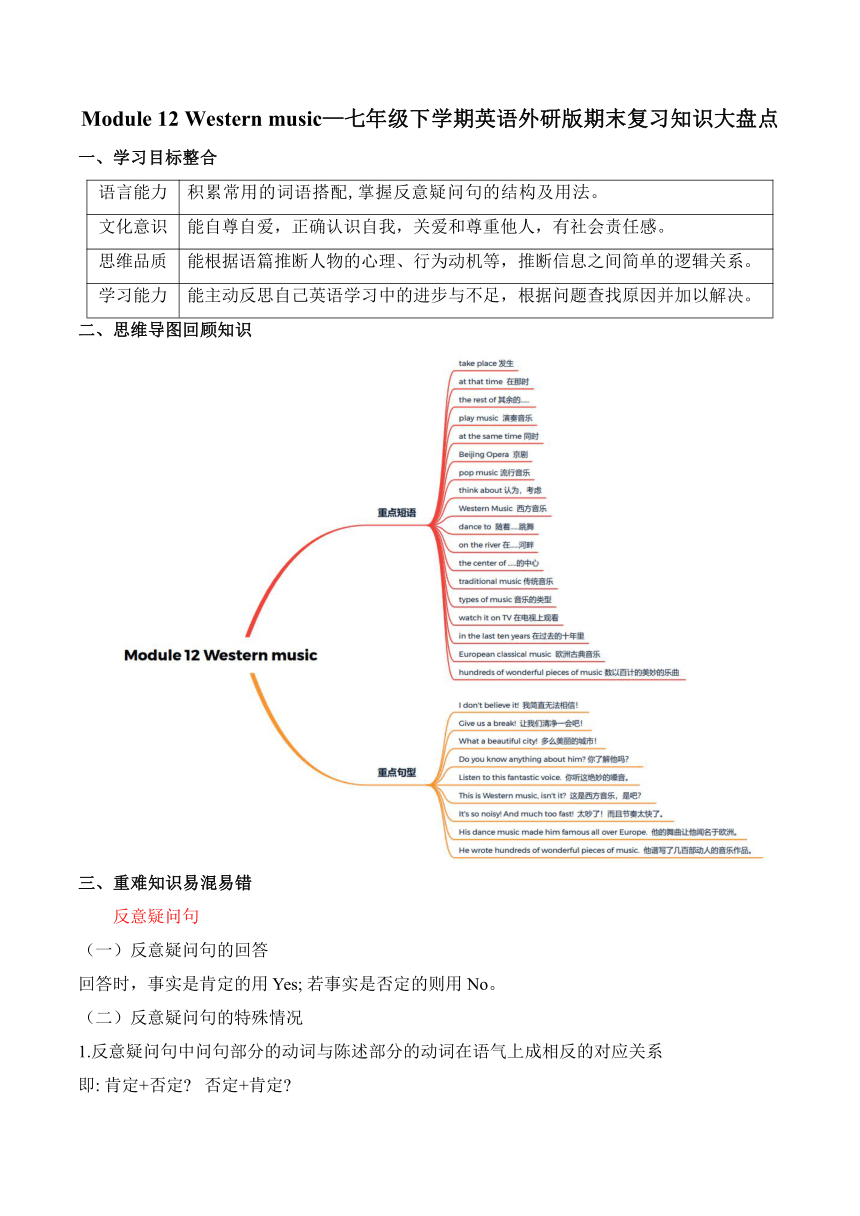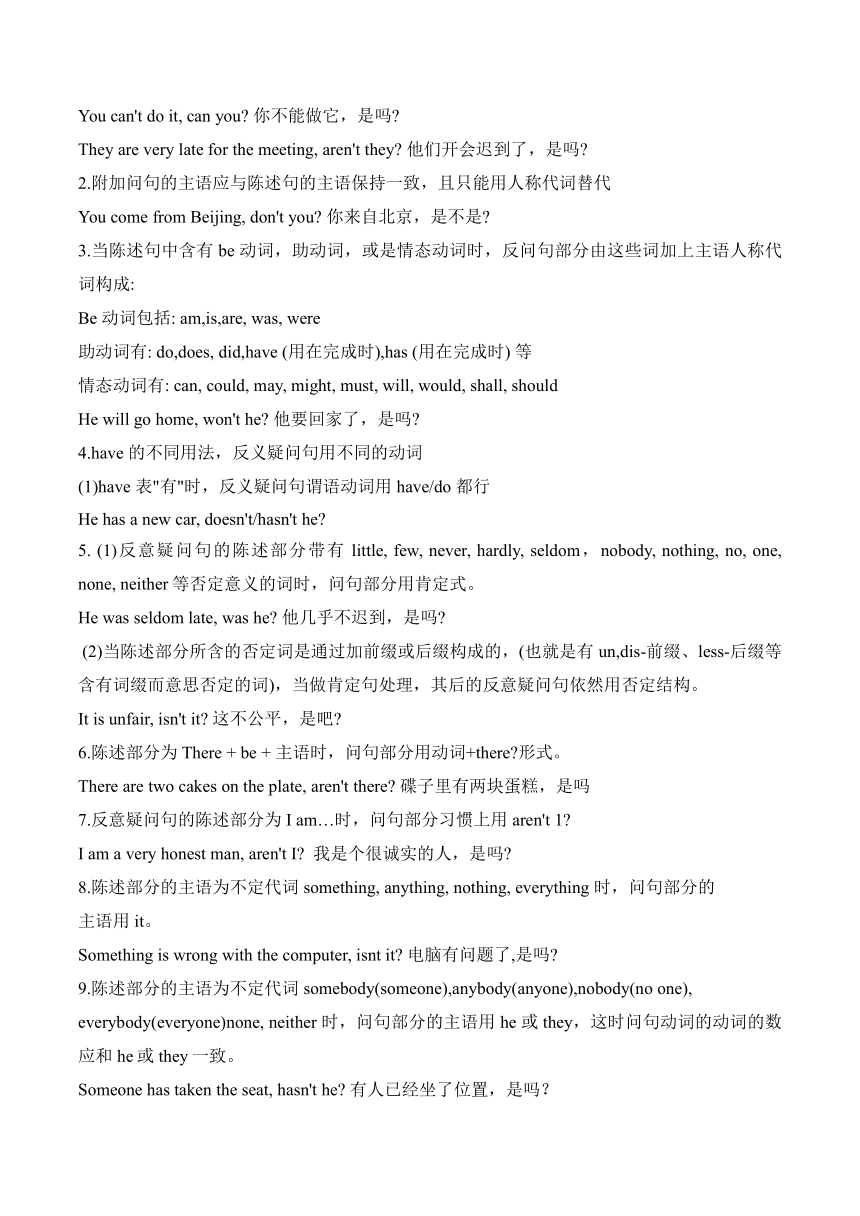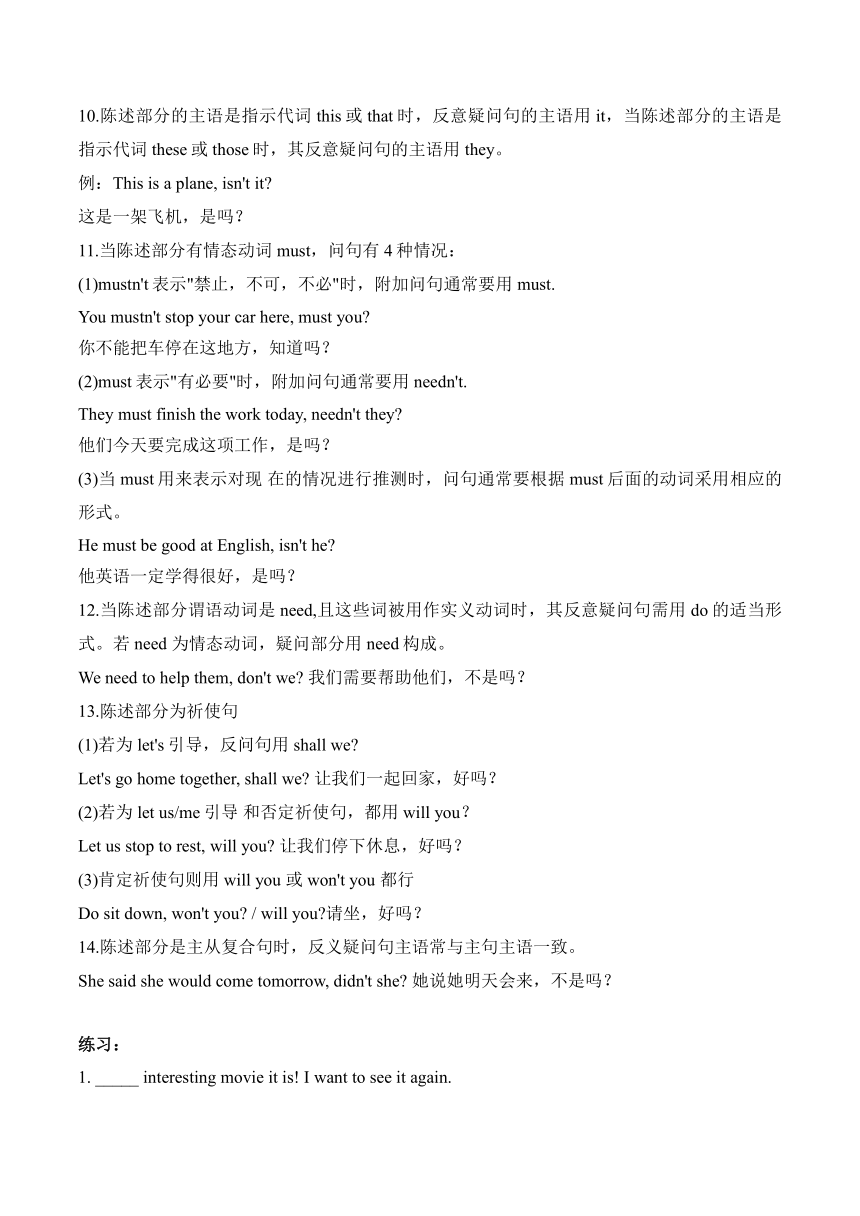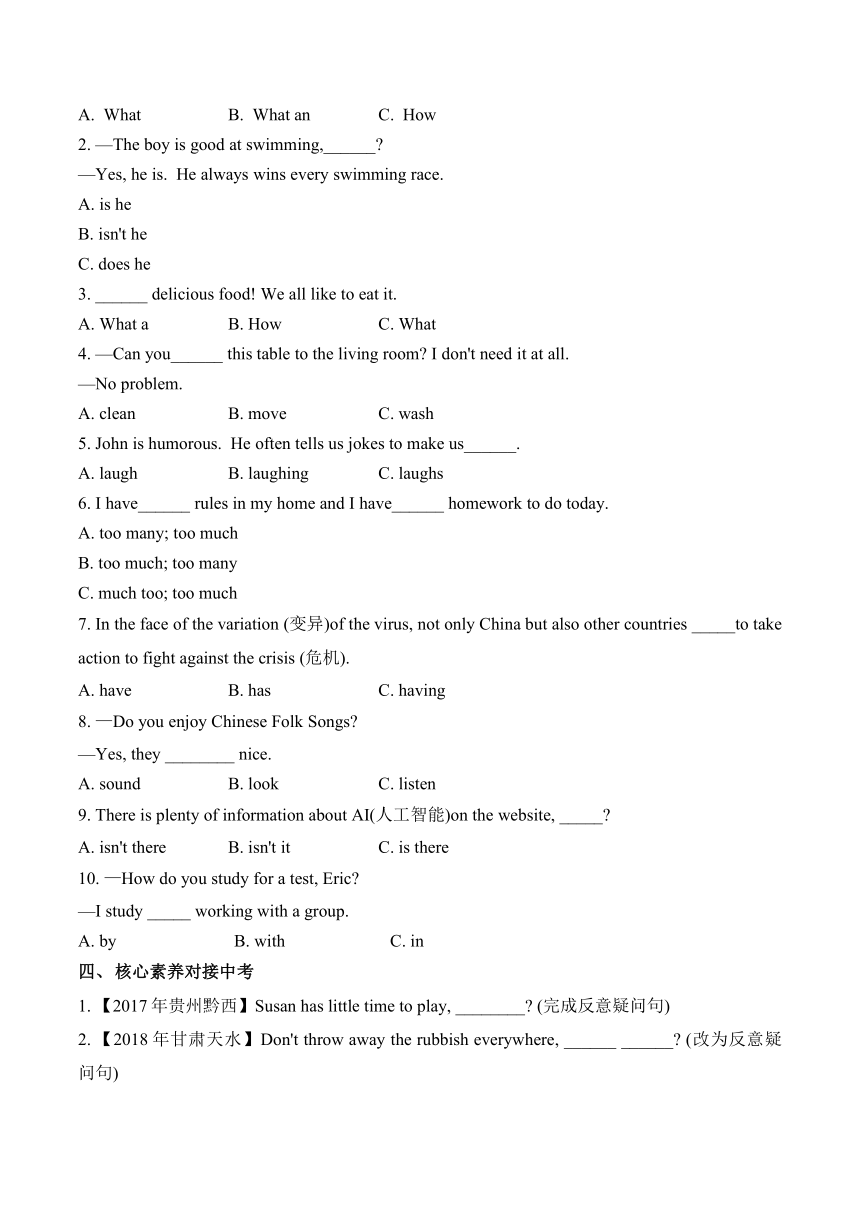Module 12 Western music 期末复习知识大盘点 及练习(含解析) 2023-2024学年外研版七年级英语下册
文档属性
| 名称 | Module 12 Western music 期末复习知识大盘点 及练习(含解析) 2023-2024学年外研版七年级英语下册 |  | |
| 格式 | docx | ||
| 文件大小 | 191.2KB | ||
| 资源类型 | 教案 | ||
| 版本资源 | 外研版 | ||
| 科目 | 英语 | ||
| 更新时间 | 2024-05-31 17:22:22 | ||
图片预览




文档简介
Module 12 Western music—七年级下学期英语外研版期末复习知识大盘点
一、学习目标整合
语言能力 积累常用的词语搭配,掌握反意疑问句的结构及用法。
文化意识 能自尊自爱,正确认识自我,关爱和尊重他人,有社会责任感。
思维品质 能根据语篇推断人物的心理、行为动机等,推断信息之间简单的逻辑关系。
学习能力 能主动反思自己英语学习中的进步与不足,根据问题查找原因并加以解决。
二、思维导图回顾知识
三、重难知识易混易错
反意疑问句
(一)反意疑问句的回答
回答时,事实是肯定的用 Yes; 若事实是否定的则用No。
(二)反意疑问句的特殊情况
1.反意疑问句中问句部分的动词与陈述部分的动词在语气上成相反的对应关系
即: 肯定+否定 否定+肯定
You can't do it, can you 你不能做它,是吗
They are very late for the meeting, aren't they 他们开会迟到了,是吗
2.附加问句的主语应与陈述句的主语保持一致,且只能用人称代词替代
You come from Beijing, don't you 你来自北京,是不是
3.当陈述句中含有 be 动词,助动词,或是情态动词时,反问句部分由这些词加上主语人称代词构成:
Be 动词包括: am,is,are, was, were
助动词有: do,does, did,have (用在完成时),has (用在完成时) 等
情态动词有: can, could, may, might, must, will, would, shall, should
He will go home, won't he 他要回家了,是吗
4.have 的不同用法,反义疑问句用不同的动词
(1)have 表"有"时,反义疑问句谓语动词用have/do 都行
He has a new car, doesn't/hasn't he
5. (1)反意疑问句的陈述部分带有 little, few, never, hardly, seldom,nobody, nothing, no, one, none, neither等否定意义的词时,问句部分用肯定式。
He was seldom late, was he 他几乎不迟到,是吗
(2)当陈述部分所含的否定词是通过加前缀或后缀构成的,(也就是有 un,dis-前缀、less-后缀等含有词缀而意思否定的词),当做肯定句处理,其后的反意疑问句依然用否定结构。
It is unfair, isn't it 这不公平,是吧
6.陈述部分为 There + be + 主语时,问句部分用动词+there 形式。
There are two cakes on the plate, aren't there 碟子里有两块蛋糕,是吗
7.反意疑问句的陈述部分为 I am…时,问句部分习惯上用aren't 1
I am a very honest man, aren't I 我是个很诚实的人,是吗
8.陈述部分的主语为不定代词 something, anything, nothing, everything 时,问句部分的
主语用 it。
Something is wrong with the computer, isnt it 电脑有问题了,是吗
9.陈述部分的主语为不定代词somebody(someone),anybody(anyone),nobody(no one),
everybody(everyone)none, neither 时,问句部分的主语用he 或 they,这时问句动词的动词的数应和he或 they一致。
Someone has taken the seat, hasn't he 有人已经坐了位置,是吗?
10.陈述部分的主语是指示代词this或that时,反意疑问句的主语用it,当陈述部分的主语是指示代词these或those时,其反意疑问句的主语用they。
例:This is a plane, isn't it
这是一架飞机,是吗?
11.当陈述部分有情态动词must,问句有4种情况:
(1)mustn't表示"禁止,不可,不必"时,附加问句通常要用must.
You mustn't stop your car here, must you
你不能把车停在这地方,知道吗?
(2)must表示"有必要"时,附加问句通常要用needn't.
They must finish the work today, needn't they
他们今天要完成这项工作,是吗?
(3)当must用来表示对现 在的情况进行推测时,问句通常要根据must后面的动词采用相应的形式。
He must be good at English, isn't he
他英语一定学得很好,是吗?
12.当陈述部分谓语动词是need,且这些词被用作实义动词时,其反意疑问句需用do的适当形式。若need 为情态动词,疑问部分用need构成。
We need to help them, don't we 我们需要帮助他们,不是吗?
13.陈述部分为祈使句
(1)若为let's引导,反问句用shall we
Let's go home together, shall we 让我们一起回家,好吗?
(2)若为let us/me引导 和否定祈使句,都用will you?
Let us stop to rest, will you 让我们停下休息,好吗?
(3)肯定祈使句则用will you 或won't you 都行
Do sit down, won't you / will you 请坐,好吗?
14.陈述部分是主从复合句时,反义疑问句主语常与主句主语一致。
She said she would come tomorrow, didn't she 她说她明天会来,不是吗?
练习:
1. _____ interesting movie it is! I want to see it again.
A. What B. What an C. How
2. —The boy is good at swimming,______
—Yes, he is. He always wins every swimming race.
A. is he
B. isn't he
C. does he
3. ______ delicious food! We all like to eat it.
A. What a B. How C. What
4. —Can you______ this table to the living room I don't need it at all.
—No problem.
A. clean B. move C. wash
5. John is humorous. He often tells us jokes to make us______.
A. laugh B. laughing C. laughs
6. I have______ rules in my home and I have______ homework to do today.
A. too many; too much
B. too much; too many
C. much too; too much
7. In the face of the variation (变异)of the virus, not only China but also other countries _____to take action to fight against the crisis (危机).
A. have B. has C. having
8. —Do you enjoy Chinese Folk Songs
—Yes, they ________ nice.
A. sound B. look C. listen
9. There is plenty of information about AI(人工智能)on the website, _____
A. isn't there B. isn't it C. is there
10. —How do you study for a test, Eric
—I study _____ working with a group.
A. by B. with C. in
核心素养对接中考
【2017年贵州黔西】Susan has little time to play, ________ (完成反意疑问句)
【2018年甘肃天水】Don't throw away the rubbish everywhere, ______ ______ (改为反意疑问句)
【2020年四川达州】David can hardly speak Chinese.(改为反意疑问句)
David can hardly speak Chinese, ________ ________
我们今天下午去购物吧,好吗?
Let's ______ ______ this afternoon, ________ ______
5. 火车经常晚点,不是吗?
6. Let's make a model plane for Kangkang's birthday, _____ _____ (完成反意疑问句)
7. You know Santa Claus. (改为反意疑问句)
You know Santa Claus, __________ _________
8. Let's go to the movies tonight. (改为反意疑问句)
Let’s go to the movies tonight, __________
答案以及解析
三、
1.答案:B
解析:感叹句。句意为:多么有趣的一部电影啊!我想再看一次。分析句子结构可知,感叹句的中心词是可数名词单数“movie”,所以本句应用“What+a/an+可数名词单数+主语+谓语!”的感叹句句型;且形容词“interesting”是读音以元音音素开头的单词,所以该感叹句中的不定冠词应用an。故选B。
2.答案:B
解析:陈述部分谓语动词为is,且陈述部分是肯定句,附加疑问部分要用isn't he。
3.答案:C
解析:感叹名词food要用what,而且food在此处是不可数名词,其前不必加不定冠词,故答案为C。
4.答案:B
解析:根据本题语境可知,说话人要对方把这个桌子移到客厅去,move符合题意。
5.答案:A
解析:make sb.do sth.意为“使某人做某事”,故答案为A。
6.答案:A
解析:修饰rules要用too many;修饰homework要用too much。
7.答案:A
解析:not only...but also...连接并列主语时,谓语动词形式由离其最近的主语决定。根据other countries可知选A项。
8.答案:A
解析:句意:—你喜欢中国民歌吗?—是的,它们听起来很棒。考查动词辨析。sound听起来;look看起来;listen听。此空后接形容词nice作表语,此空应填一个连系动词,排除C选项。根据“Chinese Folk Songs”可知,歌曲是听起来优美,故选A。
9.答案:A
解析:此处为反意疑问句,前面的陈述部分为肯定句,疑问部分应用否定形式;陈述部分为there be 句型,故选A项。
10.答案:A
解析:考查介词辨析。句意为:Eric,你是如何为考试做准备的 我通过小组合作来学习。此处应用介词by表示方式。故选A。
四、
1. does she
解析:句意:Susan没有时间玩,不是吗 根据反意疑问句遵循“前肯后否,前否后肯”原则,由“little”"可知,陈述部分是否定的,疑问部分要用肯定,has是实义动词,所以用助动词does,用she代替Susan,故填does she。
2. will/can you
解析:句意:不要到处乱扔垃圾。根据“Don'+动词原形"开头可知,该句中陈述部分为否定的祈使句,附加问句除了可用will you外,也可用can you,所以①空填will/can,②空填you。故填will/can; you。
3. can be
解析:句意:大卫几乎不会讲中文。题目要求改为反意疑问句。分析句子可知,原句中含有情态动词can,所以反意部分也用can的适当形式;因为原句中含有hardly表否定,根据“前否后肯”原则,反意部分应用肯定形式:又因为原句主语是David指男性,所以用he代替。故填can;he。
答案:go shopping shall we
解析:“去购物”为go shopping,let sb. do sth.“让某人干某事”,固定用法;在let’s…句型中,反意疑问句的疑问部分应用shall we。故填go;shopping;shall;we。
.答案:The train is always late, isn't it
解析:根据句意提示"火车经常晚点,不是吗 ",可知本题为反意疑问句,且为一般现在时态。考虑陈述句部分为Trains are often late,根据反意疑问句"前肯后否"的原则,考虑疑问句部分用aren't they 故填:Trains are often late, aren't they
答案:shall we
解析:句意:让我们为康康的生日做一架飞机模型,好吗 原句为祈使句Let's…结构,反意疑问句应用shall we。故填shall we。
答案:don’t you
解析:反义疑问句,遵循前肯后否,前否后肯的原则,本句前句是肯定句,后句应是否定句,句子谓语是实义动词know,主语是you,故应使用助动词don't,故答案是don't you。
答案:shall we
解析:对于Let's+动词原形,构成反意一般疑问句用shall we。故答案为: shall; we。
一、学习目标整合
语言能力 积累常用的词语搭配,掌握反意疑问句的结构及用法。
文化意识 能自尊自爱,正确认识自我,关爱和尊重他人,有社会责任感。
思维品质 能根据语篇推断人物的心理、行为动机等,推断信息之间简单的逻辑关系。
学习能力 能主动反思自己英语学习中的进步与不足,根据问题查找原因并加以解决。
二、思维导图回顾知识
三、重难知识易混易错
反意疑问句
(一)反意疑问句的回答
回答时,事实是肯定的用 Yes; 若事实是否定的则用No。
(二)反意疑问句的特殊情况
1.反意疑问句中问句部分的动词与陈述部分的动词在语气上成相反的对应关系
即: 肯定+否定 否定+肯定
You can't do it, can you 你不能做它,是吗
They are very late for the meeting, aren't they 他们开会迟到了,是吗
2.附加问句的主语应与陈述句的主语保持一致,且只能用人称代词替代
You come from Beijing, don't you 你来自北京,是不是
3.当陈述句中含有 be 动词,助动词,或是情态动词时,反问句部分由这些词加上主语人称代词构成:
Be 动词包括: am,is,are, was, were
助动词有: do,does, did,have (用在完成时),has (用在完成时) 等
情态动词有: can, could, may, might, must, will, would, shall, should
He will go home, won't he 他要回家了,是吗
4.have 的不同用法,反义疑问句用不同的动词
(1)have 表"有"时,反义疑问句谓语动词用have/do 都行
He has a new car, doesn't/hasn't he
5. (1)反意疑问句的陈述部分带有 little, few, never, hardly, seldom,nobody, nothing, no, one, none, neither等否定意义的词时,问句部分用肯定式。
He was seldom late, was he 他几乎不迟到,是吗
(2)当陈述部分所含的否定词是通过加前缀或后缀构成的,(也就是有 un,dis-前缀、less-后缀等含有词缀而意思否定的词),当做肯定句处理,其后的反意疑问句依然用否定结构。
It is unfair, isn't it 这不公平,是吧
6.陈述部分为 There + be + 主语时,问句部分用动词+there 形式。
There are two cakes on the plate, aren't there 碟子里有两块蛋糕,是吗
7.反意疑问句的陈述部分为 I am…时,问句部分习惯上用aren't 1
I am a very honest man, aren't I 我是个很诚实的人,是吗
8.陈述部分的主语为不定代词 something, anything, nothing, everything 时,问句部分的
主语用 it。
Something is wrong with the computer, isnt it 电脑有问题了,是吗
9.陈述部分的主语为不定代词somebody(someone),anybody(anyone),nobody(no one),
everybody(everyone)none, neither 时,问句部分的主语用he 或 they,这时问句动词的动词的数应和he或 they一致。
Someone has taken the seat, hasn't he 有人已经坐了位置,是吗?
10.陈述部分的主语是指示代词this或that时,反意疑问句的主语用it,当陈述部分的主语是指示代词these或those时,其反意疑问句的主语用they。
例:This is a plane, isn't it
这是一架飞机,是吗?
11.当陈述部分有情态动词must,问句有4种情况:
(1)mustn't表示"禁止,不可,不必"时,附加问句通常要用must.
You mustn't stop your car here, must you
你不能把车停在这地方,知道吗?
(2)must表示"有必要"时,附加问句通常要用needn't.
They must finish the work today, needn't they
他们今天要完成这项工作,是吗?
(3)当must用来表示对现 在的情况进行推测时,问句通常要根据must后面的动词采用相应的形式。
He must be good at English, isn't he
他英语一定学得很好,是吗?
12.当陈述部分谓语动词是need,且这些词被用作实义动词时,其反意疑问句需用do的适当形式。若need 为情态动词,疑问部分用need构成。
We need to help them, don't we 我们需要帮助他们,不是吗?
13.陈述部分为祈使句
(1)若为let's引导,反问句用shall we
Let's go home together, shall we 让我们一起回家,好吗?
(2)若为let us/me引导 和否定祈使句,都用will you?
Let us stop to rest, will you 让我们停下休息,好吗?
(3)肯定祈使句则用will you 或won't you 都行
Do sit down, won't you / will you 请坐,好吗?
14.陈述部分是主从复合句时,反义疑问句主语常与主句主语一致。
She said she would come tomorrow, didn't she 她说她明天会来,不是吗?
练习:
1. _____ interesting movie it is! I want to see it again.
A. What B. What an C. How
2. —The boy is good at swimming,______
—Yes, he is. He always wins every swimming race.
A. is he
B. isn't he
C. does he
3. ______ delicious food! We all like to eat it.
A. What a B. How C. What
4. —Can you______ this table to the living room I don't need it at all.
—No problem.
A. clean B. move C. wash
5. John is humorous. He often tells us jokes to make us______.
A. laugh B. laughing C. laughs
6. I have______ rules in my home and I have______ homework to do today.
A. too many; too much
B. too much; too many
C. much too; too much
7. In the face of the variation (变异)of the virus, not only China but also other countries _____to take action to fight against the crisis (危机).
A. have B. has C. having
8. —Do you enjoy Chinese Folk Songs
—Yes, they ________ nice.
A. sound B. look C. listen
9. There is plenty of information about AI(人工智能)on the website, _____
A. isn't there B. isn't it C. is there
10. —How do you study for a test, Eric
—I study _____ working with a group.
A. by B. with C. in
核心素养对接中考
【2017年贵州黔西】Susan has little time to play, ________ (完成反意疑问句)
【2018年甘肃天水】Don't throw away the rubbish everywhere, ______ ______ (改为反意疑问句)
【2020年四川达州】David can hardly speak Chinese.(改为反意疑问句)
David can hardly speak Chinese, ________ ________
我们今天下午去购物吧,好吗?
Let's ______ ______ this afternoon, ________ ______
5. 火车经常晚点,不是吗?
6. Let's make a model plane for Kangkang's birthday, _____ _____ (完成反意疑问句)
7. You know Santa Claus. (改为反意疑问句)
You know Santa Claus, __________ _________
8. Let's go to the movies tonight. (改为反意疑问句)
Let’s go to the movies tonight, __________
答案以及解析
三、
1.答案:B
解析:感叹句。句意为:多么有趣的一部电影啊!我想再看一次。分析句子结构可知,感叹句的中心词是可数名词单数“movie”,所以本句应用“What+a/an+可数名词单数+主语+谓语!”的感叹句句型;且形容词“interesting”是读音以元音音素开头的单词,所以该感叹句中的不定冠词应用an。故选B。
2.答案:B
解析:陈述部分谓语动词为is,且陈述部分是肯定句,附加疑问部分要用isn't he。
3.答案:C
解析:感叹名词food要用what,而且food在此处是不可数名词,其前不必加不定冠词,故答案为C。
4.答案:B
解析:根据本题语境可知,说话人要对方把这个桌子移到客厅去,move符合题意。
5.答案:A
解析:make sb.do sth.意为“使某人做某事”,故答案为A。
6.答案:A
解析:修饰rules要用too many;修饰homework要用too much。
7.答案:A
解析:not only...but also...连接并列主语时,谓语动词形式由离其最近的主语决定。根据other countries可知选A项。
8.答案:A
解析:句意:—你喜欢中国民歌吗?—是的,它们听起来很棒。考查动词辨析。sound听起来;look看起来;listen听。此空后接形容词nice作表语,此空应填一个连系动词,排除C选项。根据“Chinese Folk Songs”可知,歌曲是听起来优美,故选A。
9.答案:A
解析:此处为反意疑问句,前面的陈述部分为肯定句,疑问部分应用否定形式;陈述部分为there be 句型,故选A项。
10.答案:A
解析:考查介词辨析。句意为:Eric,你是如何为考试做准备的 我通过小组合作来学习。此处应用介词by表示方式。故选A。
四、
1. does she
解析:句意:Susan没有时间玩,不是吗 根据反意疑问句遵循“前肯后否,前否后肯”原则,由“little”"可知,陈述部分是否定的,疑问部分要用肯定,has是实义动词,所以用助动词does,用she代替Susan,故填does she。
2. will/can you
解析:句意:不要到处乱扔垃圾。根据“Don'+动词原形"开头可知,该句中陈述部分为否定的祈使句,附加问句除了可用will you外,也可用can you,所以①空填will/can,②空填you。故填will/can; you。
3. can be
解析:句意:大卫几乎不会讲中文。题目要求改为反意疑问句。分析句子可知,原句中含有情态动词can,所以反意部分也用can的适当形式;因为原句中含有hardly表否定,根据“前否后肯”原则,反意部分应用肯定形式:又因为原句主语是David指男性,所以用he代替。故填can;he。
答案:go shopping shall we
解析:“去购物”为go shopping,let sb. do sth.“让某人干某事”,固定用法;在let’s…句型中,反意疑问句的疑问部分应用shall we。故填go;shopping;shall;we。
.答案:The train is always late, isn't it
解析:根据句意提示"火车经常晚点,不是吗 ",可知本题为反意疑问句,且为一般现在时态。考虑陈述句部分为Trains are often late,根据反意疑问句"前肯后否"的原则,考虑疑问句部分用aren't they 故填:Trains are often late, aren't they
答案:shall we
解析:句意:让我们为康康的生日做一架飞机模型,好吗 原句为祈使句Let's…结构,反意疑问句应用shall we。故填shall we。
答案:don’t you
解析:反义疑问句,遵循前肯后否,前否后肯的原则,本句前句是肯定句,后句应是否定句,句子谓语是实义动词know,主语是you,故应使用助动词don't,故答案是don't you。
答案:shall we
解析:对于Let's+动词原形,构成反意一般疑问句用shall we。故答案为: shall; we。
同课章节目录
